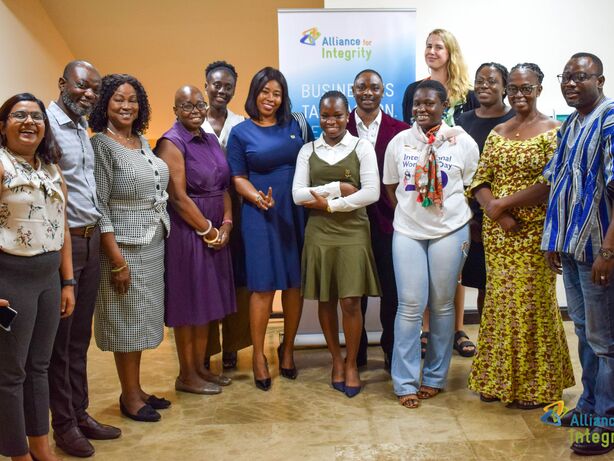
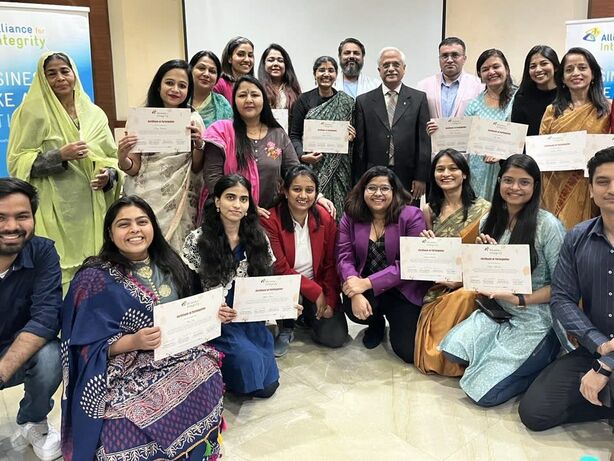
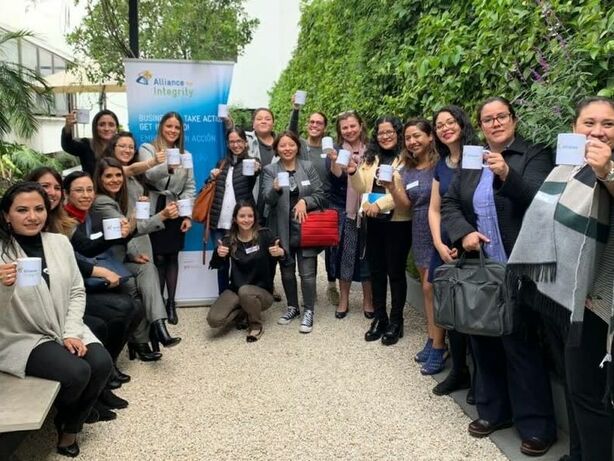
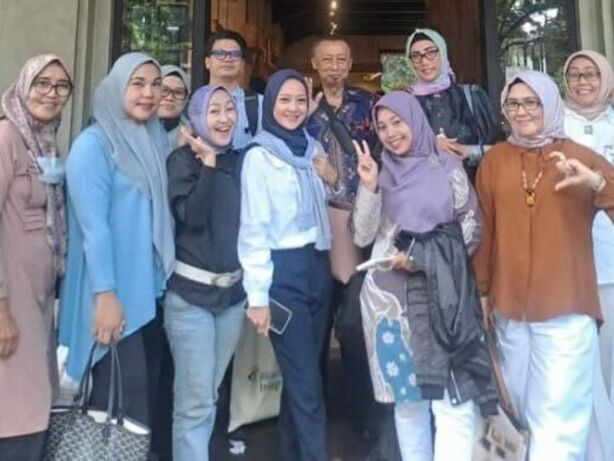
AntiCorruption and gender
“As there is a gender differentiation in the negative impact of corruption, it is essential to always include a gender perspective in business integrity efforts. There is no need to be an expert, a good way to start is recognising it." - Marco Perez, Gender Coordinator of the Alliance for Integrity
On this topic page we provide relevant publications, activities, best practice examples and statements of our partners and supporters on the connection between gender and corruption.
The topic page will be continuously updated with new content and material. We invite you to join our efforts and to actively contribute to a level playing field with equal opportunities for all.
The links between gender and corruption are increasingly highlighted by both academia and the international community. For instance, they are part of the G20 commitments set out in 2018. However, not everyone is aware of the connection between the two concepts. The reason is often a lack of understanding. Thus, the first step in tackling the issue is to analyse and understand it more thoroughly.
Even considered individually, both concepts are very complex. Depending on the context, cultural background, legal framework and ideologies, the terms are defined differently. We therefore need to respond to the problem with a holistic and aligned approach. It is crucial to not only address the problem by considering technicalities and etymological aspects, but above all the main factor in this nexus: the underlying power relations.
Together with our partners and supporters we have elaborated concrete strategies to combine gender-specific measures with anti-corruption efforts. This includes, amongst others, adapting instruments used in both areas, (e.g. complaint systems) and ensuring that the gender perspective is taken into account throughout the entire compliance programme (e.g. establishing a code of ethics with a gender perspective).
In other words, we have grounded both concepts in practical situations to mitigate their abstract character. In our opinion it is essential to not only talk about “gender and business” or “gender and corruption”, but “gender and business integrity” and consequently about the benefits of implementing internal strategies that make companies more efficient and inclusive.
Therefore, we as initiative “walk the talk”. The Alliance for Integrity promotes a gender perspective in all its activities to ensure that all voices, female and male, are heard equally. We invite you to join in our mission of creating a business environment based on integrity that allows an equal, inclusive and fair playground for all actors in the economic system, especially for the more vulnerable.
Find statements of our partners and supporters that point out why it is crucial to include a gender perspective in anti-corruption and compliance efforts.
Linda Ofori-Kwafo - Ghana Integrity Initiative
Executive Director, Ghana Integrity Initiative

“Collective action is needed for the success of any anticorruption programme. Gender is a critical aspect of collective action; therefore, gender perspectives are essential to all anticorruption efforts.”
Kosi Antwiwaa Yankey - National Board for Small Scale Industries, Ghana
Executive director, national board for small scale industries

“Empowering women-led SMEs is at the heart of sustainable economic development. An empowered women business leader illuminates her society.”
Jeffrey Cheung - Indonesa-HongKong Business Association
Deputy Director, Indonesia-HongKong Business Association

"Adding a gender perspective can significantly improve our understanding of the dynamics of behaviour that drive corruption and anti-corruption; thus, giving the current approach a much needed dimension and effectiveness.”
R. Devi Damayanthi - Double-D Fashion Clothing & Apparel, Indonesia
Member of WIN and Owner of Double-D Fashion Clothing & Apparel
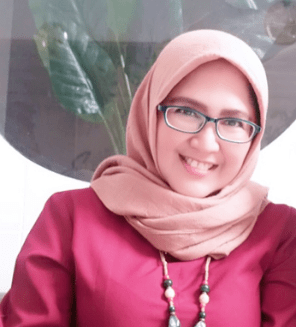
“In supporting corruption eradication, we need more than a movement, especially in the public sector where corruption cases are still happening extensively. Instilling anti-corruption values can be started from the smallest environment, such as zero-tolerance against corruption, then in the family environment and later in the company or one’s own business. The fight against corruption must be fought together, regardless of gender.”
Tini Gustini - KALAPA INDUNG, Indonesia
Owner of Kalapa Indung: Indonesian Traditional Food, Field Companion PEKKA Bandung City, and Member of WIN

"Women entrepreneurs have a very important role to play in efforts to eradicate corruption. Women have the power to build a business and in this position, they can be a good example of the anti-corruption movement, for example by ensuring the legality of companies through formal channels without bribes or saying no to collusion in the working environment. This action will create a healthy economy in the country.”
Y.W. Junardy - Indonesian Global Compact Network (IGCN)
President of the Indonesian Global Compact Network (IGCN)

“As a responsible company, a commitment to integrity and the implementation of human rights are even more important in this pandemic situation. At the same time, gender equality plays an important role in ensuring sustainability.”
Neneng Lela - Ikatan Pengusaha Muslimah Indonesia
Member of Ikatan Pengusaha Muslimah Indonesia
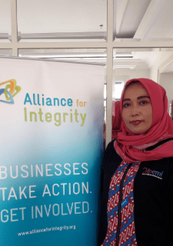
“As female business owners, we have to be assertive, show confidence and say no to any unofficial request.”
Shabnam Siddiqui - UN Global Compact Network India
Director of the UN Global Compact Network India
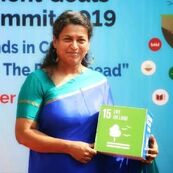
“One of the most common and silent forms of corruption emerging across the globe is sextortion, where sex is the currency of bribe. To acknowledge and work against it, is the need of the hour.”
Santhy Sri Yunita - IWAPI DPC Bandung, Indonesia
Member of WIN and Owner of CV. Gemilang Sukses Lestari, Head VI Creative Economic IWAPI DPC Bandung

“In supporting corruption eradication, we need more than a movement, especially in the public sector where corruption cases are still happening extensively. Instilling anti-corruption values can be started from the smallest environment, such as zero-tolerance against corruption, then in the family environment and later in the company or one’s own business. The fight against corruption must be fought together, regardless of gender.”
Wina Wardina - PPLIPI, Indonesia
Member of WIN and Head of Youth and Sports, PPLiPi

“The participation of women from all professions and businesses who play an active role in the fight against corruption is a form of support for healthy economic development and business integrity.”
Nia Yuniasari - BENUA BALANTIK COMMUNITY, Indonesia
Volunteer, Management of Benua Balantik Community and Member of WIN
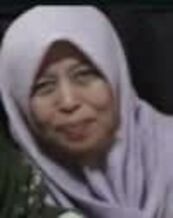
"Women entrepreneurs have a very important role to play in efforts to eradicate corruption. Women have the power to build a business and in this position, they can be a good example of the anti-corruption movement, for example by ensuring the legality of companies through formal channels without bribes or saying no to collusion in the working environment. This action will create a healthy economy in the country.”
Daniela Camargo - Global Compact Network Colombia
Coordinator of Human Rights and Anticorruption of the Global Compact Network Colombia

“Supporting each other among women is necessary to survive in the competitive and demanding business world, especially when it comes to corruption.”
Ricardo Corona - Laureate Education, Inc., Mexico
Regional Director of Compliance at Laureate Education, Inc.

“Even though corruption affects everyone, it affects people in vulnerable situations more (indigenous people, migrants, etc.). Historically we have witnessed the multiple forms of violence women are targeted and the inequality it generates. Is there any doubt we have to tackle both problems?”
Angela Corso - Enel Américas, Chile
Head of Audit Staff and Compliance at Enel Américas
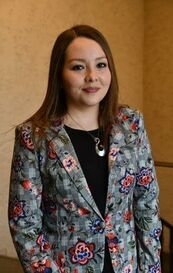
“Corruption is the root cause of different forms of discrimination, injustice, inequity and poverty. A gender perspective makes it easier to identify the most vulnerable populations while making efforts in the fight against this scourge more efficient.”
Erika Díaz - Covestro, Mexico
Head of Law, Intellectual Property & Compliance at Covestro

"Gender perspective in anti-corruption efforts is crucial to produce meaningful changes within society, companies, and governments towards an inclusive and fair environment for women."
Daniela Falfán - Grupo Inditex, Mexico
General Counsel & Compliance Officer, Grupo Inditex

“Inclusion is no longer just a moral obligation; it is a commercial and financial strategy to improve the profitability of businesses.”
Salomé Flores - UNODC, Mexico
National Programme Officer, Research and Corruption, UNODC
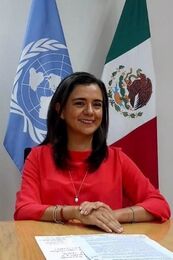
"Women in social, political or cultural contexts where they exert less power than men, may face more corruption experiences and their response array to these experiences may be much more limited. Promoting women's participation and empowerment is critical to reduce their vulnerability to corruption."
Luz Elena Gómez-Haro López - PepsiCo Mexico
Director of Compliance & Ethics, PepsiCo Mexico

Andrea González - Citizen Participation Committee of the Guanajuato State Anticorruption System, Mexico
Professor at the Tecnológico de Monterrey and member of the Citizen Participation Committee of the Guanajuato State Anticorruption System
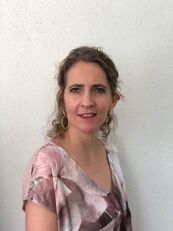
"Today, more than ever, women are needed as the main family and social leaders to achieve a change in the integrity of citizens."
Liliana Gutiérrez de Piñeres - Lemaitre Consultores and Faculty of Public Accounting at the Universidad Externado de Colombia
Founding Partner of Lemaitre Consultores and Academic and Research Director of the Faculty of Public Accounting at the Universidad Externado de Colombia

"Although the crime of corruption is genderless, the consequences for its victims are not, addressing prevention and reparation from a gender perspective allows us to design and apply inclusive actions."
Patricia Manusovich - Lawyer, Argentina
Lawyer specialised in Ethics and Compliance, Public Integrity and Gender

"Corruption has an unequal impact on women, affecting especially the weakest.”
Maria Barbara Marcen Abascal - Baker McKenzie Mexico
Chief Compliance Officer, Baker MCKenzie Mexico

“Business integrity is the imminent result of the integrity of all human beings that make it up, men and women.”
Katya Morales - Citizen Participation Committee of the Guanajuato State Anticorruption System, Mexico
Member of the Citizen Participation Committee of the Guanajuato State Anticorruption System

"Corruption creates inequality gaps. With the same force that we have fought for the recognition of our rights we must fight to eradicate corruption, so that we truly all have the same opportunities."
Leila Insaurralde Moreno - Anticorruption Management Department, General Direction of Legal Affairs of Paraguay
Head of the Anticorruption Management Department, General Direction of Legal Affairs of paraguay

“Supporting each other among women is necessary to survive in the competitive and demanding business world, especially when it comes to corruption.”
Leonor Ortiz - Mexicans Against Corruption and Impunity, Mexico
Applied Research, Mexicans Against Corruption and Impunity

"Corruption affects women disproportionately. Accepting this reality and assuming it when proposing solutions is urgent. Without a gender perspective, any anti-corruption effort will be limited in scope and ineffective.”
Luz Ayda Otalora - Telefónica Movistar, Colombia
Compliance Officer at Telefónica Movistar

"Although the destructive effects of corruption affect us all in some way, making visible the sharpness with which it strikes more vulnerable groups such as women and girls contributes to seeking for effective solutions."
Maria Laura Parcerisa - Independent Professional, Argentina
Independent Professional, Ethics and Compliance

Gustavo Pérez - Grupo Restaurantero Gigante, Mexico
Director of Social Responsibility and Sustainability of Grupo Restaurantero Gigante

"Various investigations in the world have shown the correlation between the ethical behaviour and the gender of a person inserted in a certain culture. Empirical evidence demonstrates more upright behaviour in women when it comes to corruption issues. I consider that they are concepts that must be studied together and in depth to understand the objective reasons and to be able to design effective intervention strategies, building a better society."
Elizabeth Romero - Siemens SA, Colombia
Compliance Officer at Siemens SA

"We must continue to encourage gender equality spaces that allow us to better articulate the fight against corruption as a result of an effort by men and women."
Karen Schmidt Ortuño - ALEATICA Mexico
Compliance Director, ALEATICA Mexico

Mariana Suárez - Siemens Energy, Mexico
Head of Law, Intellectual Property & Compliance at Covestro

"If our purpose is to build an egalitarian society, it is important that women have the resources and support and that others give us a voice to say no to corruption."
María Marta Talice - FLOR Foundation, Argentina
Executive Programme - Government with a Gender Perspective (MeD), FLOR Foundation

“It is very important to understand why diversity adds value, what the risks of unconscious biases are and how we can incorporate a gender perspective to strengthen integrity programmes of companies.”
Mónica Vargas - Lemaitre Consultores SAS, Colombia
Consultant at Lemaitre Consultores SAS

"The gender perspective must be included because in investigations, interviews and stories told by women, it has been shown that corruption impacts them differently and from there we must address it."
Women in Compliance - Women in Compliance, Argentina
Women in Compliance

"The integration of a gender perspective in anti-corruption efforts is not only necessary, but essential and inevitable in order to fight corruption effectively. We are convinced that trying to fight corruption without considering the gender perspective will exacerbate existing inequalities, widen the gender gap, reduce equal opportunities and violate rights. Furthermore, the lack of a gender perspective, due to its impact on organisational and social culture, limits the opportunities for access to management positions and decision-making processes. This is a key element as part of the diversity and inclusion policy necessary to ensure integrity, ethics and compliance.”
Marcel Engel - Global Compact Network Germany
Executive director at Global Compact Network Germany

“The private sector plays a crucial role in fighting and preventing corruption. Corruption often affects differently – if not disproportionately – women and minorities. Including a diversity and gender perspective in business anti-corruption policies will help finding more innovative and effective solutions.”
Olajobi Makinwa - UN Global Compact Network, Ghana
Chief of Intergovernmental Relations & Africa, UN Global Compact Network

“Corruption violates human rights and contributes to human rights violations. Corruption disproportionately hurts the most vulnerable and marginalised sectors of the population, who are mostly women and girls. Women’s and girls’ lack of access to basic economic and social rights, such as the rights to health, education and adequate standards of living, as well as inequalities in many areas of social life result in women being more vulnerable to corruption and its impact than men. There is therefore a clear implication of gender on corruption. In order to be successful, anti-corruption policies, programmes, standards and laws need to recognise the gendered impacts of corruption and address the forms of corruption which affect women disproportionately and undermine their rights to human rights, including equality and non-discrimination and participation.Similarly, policies, initiatives, laws and other concrete actions to be taken to stem the tide against corruption must consider the role that women and girls should play and by doing so, be able to formulate policies that will lead to concrete results and impact. It is therefore important to mainstream gender issues in all areas of anti-corruption policies, programmes and decisions and international trading systems.”
Julia Pilgrim - Corruption and Economic Crime Branch at UNODC
Crime Prevention and Criminal Justice Officer at UNODC

“Gender affects almost every facet of our lives and even corruption does not escape its grasp. Clientelism and single-gendered networks effectively serve to exclude or limit access and thereby have disastrous and disproportionate effects on vulnerable groups and women. We cannot leave out a vital piece of the corruption puzzle and thus our anti-corruption efforts must strive to be gender responsive. This is why we at UNODC are increasingly prioritising work towards exploring the gender dimensions of corruption and are determined to harness the gender element by fostering and envisioning a more inclusive fight against corruption.”
Delia Ferreira Rubio - Transparency International
Chair of Transparency International
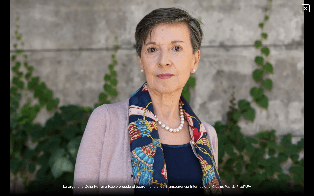
"Corruption disproportionally affects women. Sextortion – when sex is the currency of the bribe – is one of the most silent forms of corruption and demands urgent gender-sensitive legislation, enforcement and reporting mechanisms."
Discover interesting publications of our partners addressing the relation between gender and corruption.
In the past months, the Alliance for Integrity has carried out various online seminars and web formats that address relevant issues focusing on gender and corruption. Summaries of the most important takeaways can be downloaded as PDF files.
 Sextortion(159 KB)
Sextortion(159 KB)
The Alliance for Integrity walks the talk. Find here our gender-specific activities that promote female entrepreneurship and support businesswomen around the world in improving their compliance measures.
Corruption Prevention Training for Women Entrepreneurs
- Format: Training
- Country: Mexico
- Description: The Alliance for Integrity carried out two business integrity trainings (DEPE) in Mexico City (Mexico) that were aimed exclusively at women entrepreneurs. The sessions were organised together with local partners to promote female entrepreneurship. In both editions, DEPE trainers prepared hands-on cases, specifying different ways in which corruption affects women, and shared best practices.
- Impact: Businesswomen were provided with the necessary knowledge to implement effective compliance measures in their companies that will contribute to their competitiveness. Each session was attended by an average of 25 female entrepreneurs.
- More information: ToT and DEPE for women in Mexico
Ethics as an added value in negotiation for female entrepreneurs
- Format: Workshop
- Country: Colombia and Mexico
- Description: The workshop, developed by the Gender and Integrity Working Group of the Alliance for Integrity in Colombia and Mexico, arises in response to the request of female entrepreneurs from Colombia and Mexico who, after participating in the "Integrity Coffee" exchange formats, pointed out the need to strengthen their negotiation skills while ensuring that ethics within their businesses becomes an added value. The workshop covered basic concepts of gender, equality, ethics, negotiation, harassment and sextortion and relevant topics such as female leadership in the company, unconscious biases related to gender, the new masculinity and presented the step by step of an ethical negotiation model as well as negotiation exercises based on practical cases.
- Impact: The participants were female entrepreneurs who had already participated in previous exchange spaces, such as the Integrity Coffee. In those spaces, they had expressed the need to strengthen their negotiation skills where ethics could be used as an added value. At the end of the workshop, the participants shared that they had acquired better tools to ensure that ethics and integrity become differentiators in their businesses.
- More information: afin-mexico@giz.de
Integri-Tea
- Format: Exchange Platform
- Country: India
- Description: With the Integri-Tea, the Alliance for Integrity has developed a format specifically aimed at female entrepreneurs and businesswomen in India. The event provides an informal and protected setting to openly discuss corruption-related challenges and possible solutions.
- Impact: Participants share experiences, learn from each other and develop a deep understanding of tools and good practices available to prevent corruption within their businesses. To address identified weak points, bi-monthly peer-to-peer learning sessions are in preparation, as well as trainings on specific soft skills and topics relevant to the target group. Each session is attended by an average of 25 female entrepreneurs.
- More information:
Launch Event of the first Integri-Tea in India
Integri-Tea Series in the Northeast of India
Integrity Coffee
- Format: Exchange platform
- Country: Mexico and Colombia
- Description: The Integrity Coffee is a two-hour meeting of female entrepreneurs and businesswomen that takes place every two or three months. The event offers an informal and protected environment to openly discuss corruption-related challenges and possible solutions.
- Impact: Participants share experiences, learn from each other and develop a deep understanding of best practices in fighting corruption. The further aim of the event is to find out what additional tools women entrepreneurs need in the fight against corruption and how the Alliance for Integrity can support them. Each session is attended by an average of 25 female entrepreneurs.
- More information:
Alliance for Integrity launches its "Integrity Coffee" for female entrepreneurs in Mexico City
Female business leaders working together to fight corruption
Women in Colombia get together to strengthen Integrity of entrepreneurs
Interregional exchange between women entrepreneurs and compliance experts
- Format: Exchange platform
- Countries: Argentina and Indonesia
- Description: The Alliance for Integrity has initiated a regular exchange between compliance experts from Argentina and women entrepreneurs from Indonesia. In the first session, the participants have identified the main challenges for female entrepreneurs in Indonesia regarding anti-corruption and compliance efforts. During the following meetings, the businesswomen have prepared various scenarios that they are struggling with. The experts from Argentina respond to their needs and propose different solutions to support the women in their daily business.
- Impact: As a result of the exchange between peers, Indonesian women entrepreneurs are better prepared and have better tools to prevent and deal with corruption. The Argentinean experts gain a new perspective on the topic by paying more attention to the interests and needs of women entrepreneurs from another region.
- More information:
Online Exchange between female entrepreneurs from Indonesia and Argentina
The Impact of Corruption on the Economic Empowerment of Women
- Format: Contest
- Region: Globally (G20 countries)
- Description: In 2018, the Alliance for Integrity launched a writing contest targeted at postgraduates from all G20 countries where the initiative is represented. The competition aimed at understanding whether and to what extent corruption is an obstacle to the economic emancipation of women. Within a period of five months participants elaborated and submitted their ideas. The prize was a trip to Buenos Aires (Argentina) to present the essay at a high-level W20 event. Clara Luisa Machado Parisca from Mexico won the competition. Her essay deals with critical reflections on strengthening the role and integrity of women and was also published as Compliance Bulletin of the Alliance for Integrity.
- Impact: In the course of the competition, university students were made aware of the connection between gender and business integrity. This impact was extended to a wider audience through the presentation at the W20 summit.
- More information:
Compliance Bulletin 13
Women for Integrity Series (WISe)
- Format: Online exchange platform
- Country: Ghana
- Description: Starting in 2020, the format creates a platform that encourages women participation in discussing and addressing corruption issues in their line of business or work. The event takes place every four months.
- Impact: The series of events actively engages women in specific sectors of the economy to discuss and proffer solutions to issues of corruption within their space. Each session is attended by an average of 40 participants.
- More information:
Get Involved in Anti-Corruption Fight – A call to Women in Business and Leadership
Forging networks and building resilient business systems to withstand systemic corruption
Women Maintaining Integrity in Challenging Times
Women in Integrity (WIN)
- Format: Working Group
- Country: Indonesia
- Description: Women in Integrity (WIN) is a safe platform for female entrepreneurs and professionals to discuss key challenges related to corruption in day-to-day business. The members of the working group are representatives of businesswomen's associations in West Java, Indonesia. They are committed to promoting business integrity and raising awareness of the importance of anti-corruption efforts among women. Since last year WIN is also part of the Regional Advocacy Committee (RAC) West Java. The meetings take place every three months.
- Impact: The participants actively contribute to the work of the committee by sharing meaningful insights from the perspective of women-owned SMEs, their experiences and best practices in terms of anti-corruption and compliance efforts. Moreover, Women in Integrity also plays an important role as a driver in the region, that aims to turn the ideas of the participants into practice. The members are also committed to promoting business integrity within their trade associations.
- More information:
Women in Integrity: Resilience of women owned SMEs in times of crisis
Women in Integrity: Women as Important Actors in the Fight Against Corruption





